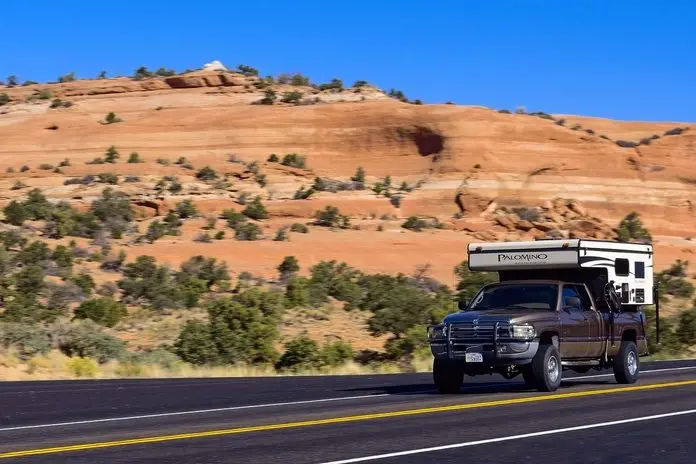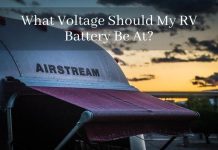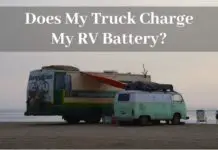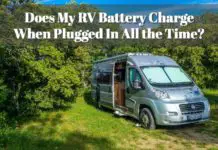
Pop up campers can do wonders while out there in the jungle. Having one makes the entire camping activity fun. It acts as a home away from the usual home you’re used to. As per the psychologists, camping is a recommended activity as it helps boost the love amongst the family member or friends. All the benefits that come with camping can only be enhanced by bringing an RV on board.
By now, maybe you have everything prepared, the RV, and stuff. But, you’re left with one part, the power supply. You need a power supply to power your fridge, bulbs, and entertainment systems while out there on the road. You need a battery to get over with the power problem.
So, what kind of battery do I need for pop up camper? The chances are that you’ve come across campers advising you to get the most massive battery in the market for your newly-acquired RV. It would be best if you didn’t allow such ideas and the many components attached to the RV confuse you.
The size of the battery does matter. But, you only need a size that can meet your power requirements. If you’re looking for a battery for your RV, the first thing that should cross your mind should be a deep cycle battery.
Why Should You Choose A Deep Cycle Battery?
RV batteries are prone to be deeply discharged regularly. Unfortunately, the standard batteries can’t cope with the draining. They can get damaged easily. It’s for this reason that you should go for a deep cycle battery to give power to your RV.
Deep cycle batteries are designed to continue supplying steady charge for an extended period. They, therefore, match the RV’s setting, where the demand for energy may be high. Deep cycle batteries are usually categorized into three categories, which include:
• Wet/flooded cells
• Dry/valve-regulated cells
• Lithium-ion batteries
1. Flooded/Wet Deep Cycle Batteries
These are the most common deep cycle batteries that you can find among most campers. You would ask the reason as to why they are common? These batteries usually come at a lower price as compared to the other categories in the market. These batteries typically have their electrolytes submerged in the electrolyte. That’s where the name wet cell comes from.
During the charging process, wet batteries are known to release oxygen and hydrogen. It’s for this reason that they come with caps to allow proper ventilation. In comparison to the other cells in the market, wet batteries are known to last longer. Therefore, if you’re looking too much about the lifespan, you ought to consider a wet cell.
With a flooded battery, you must be ready to take good care of it as it requires maintenance. This category of battery requires regular maintenance for the sake of long-term service. One disadvantage that comes with using this battery is the danger of spilling. Therefore, when used in an RV, you will need a proper battery holder.
2. Valve-Regulated Deep Cycle Batteries
The valve-regulated batteries fall into two categories, which are:
AGM Batteries
In the recent past, AGM batteries have been gaining popularity amongst drivers. Most likely, you have come across friends, and who tell you to invest in this type of cell. What these friends don’t stop to say to you is the reason why you should invest in an AGM battery. Well, AGM batteries are good and an excellent choice for your pop up camper.
These kinds of batteries are sealed, and that means that no gas is produced during the charging process. As a result, you won’t have anything to worry about the harmful gases a battery may produce. For the AGM battery, the contents are usually absorbed in fiberglass mats. With such a design, it means that you won’t experience any spillage. As a result, AGM batteries are considered to be safe for use.
AGM batteries are maintenance-free. Therefore, you won’t have to worry about tricks on how to maintain your battery. AGM batteries are highly recommended for use in an RV because they have better storage. Besides, when it comes to charging, they are quicker.
One disadvantage that comes with using an AGM battery is that they are sensitive to overcharging. But, with an automatic charger, you don’t have to worry about the battery being destroyed from overcharging.
If you want to know more about this specific battery, then read about what is an AGM car battery?
GEL Batteries
Gel batteries are designed in almost a similar manner as the AGM batteries. The only difference is that for gel batteries, the electrolyte is mixed with silica to form a gel. With the mixture, it means that the electrolyte can’t spill.
These batteries are as well-sealed and hence don’t emit any gases during the charging process. However, they require slow charging to prevent the solid electrolyte from damaging. They even need a special charger.
3. Lithium-ion Deep Cycle Battery
When shopping for a new battery for your RV, you should as well consider lithium-ion batteries. These batteries are known well for their high performance. Also, they are light in weight and hence easy to carry around while out there camping. Besides, when it comes to charging, they are the best. They charge faster.
But, before you decide to pick these batteries for your RV, you must understand that they come with a higher price tag. Yes, lithium-ion deep cycle batteries are the most expensive deep cycle batteries you can ever find for your RV. But, their price is worth every penny. The lithium-ion batteries are known to operate well at both low and high temperatures and can be mounted in any way.
The lithium-ion batteries use iron phosphate (LiFeP04). Iron phosphate is known to be safe and hence makes the battery suitable for use in a popup camper. Besides, the battery doesn’t ask for too much of your time as it’s maintenance-free. When it comes to the lifespan, these batteries ensure that every penny you spend is utilized.
Conclusion
Shopping for a new battery for your pop up camper can be a pain in the neck. With the confusion and the anxiety, you may end up picking the wrong battery. Explained in this article are classes of deep cycle battery that you should consider for your replacement. Read through the entire piece to understand which battery you should buy.
Sources:
1. Deep Cycle Battery Guide – Aussie Batteries & Solar
2. Power Anytime, Anywhere: Battery System for Camping Comfortably – Mapping Megan





